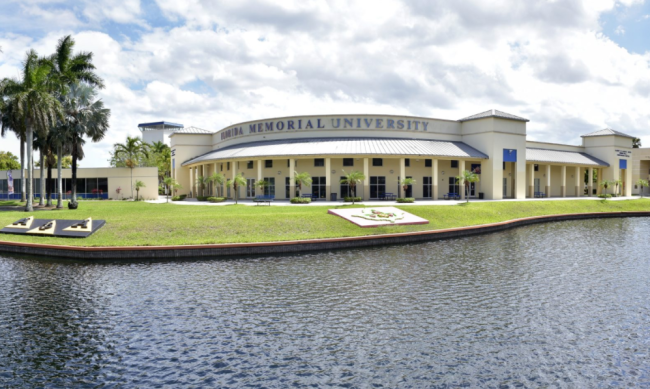You have /5 articles left.
Sign up for a free account or log in.

Florida Memorial University
Florida Memorial University has been put on a yearlong probation by its accreditor due to financial mismanagement and failure to comply with fiduciary requirements.
According to the accrediting body, the Southern Association of Colleges and Schools Commission on Colleges (SACSCOC), university leaders failed to maintain a governing board that exercises fiduciary oversight over the institution, manage financial resources in a responsible manner, utilize appropriate control over all its financial resources and comply with program responsibilities related to financial aid programs.
The accreditor said in a disclosure statement last month that the university was put on “probation for good cause.” This sanction is imposed when an institution makes insufficient progress toward meeting requirements over a two-year monitoring period but has had “significant recent accomplishments in addressing non-compliance” and “provided evidence” that it can fix problems within a year. The university remains accredited despite this action by the SACSCOC, which was first reported by the Miami Times.
Adrienne Cooper, provost and executive vice president of the university, said administrators are complying with the accreditor's demands and she is confident the institution will successfully address the problems and be taken off probation, because this particular kind of probation “doesn’t happen unless there’s clear evidence that you’re moving in the right direction.”
She said the academic standing of the institution was not in question.
“We have been messaging to students and we continue to reiterate that we continue to offer quality education, that this has nothing to do with academic quality,” Cooper said. “The degrees are absolutely still valid and will continue to be valid, that we will continue to educate students and they are still eligible for financial aid.”
SACSCOC also put three other institutions on “probation for good cause.” The accreditor sanctioned Pfeiffer University, a private Methodist liberal arts institution in North Carolina, for failing to sustain sound financial resources and responsibly manage its finances. Southwestern Christian College, a private historically Black Christian institution in Texas, was similarly put on probation for not maintaining sustainable funding and exercising appropriate control over finances. South Louisiana Community College in Lafayette was penalized for failing to adequately measure and assess student outcomes for undergraduate degree programs and provide proof of efforts to improve.
Florida Memorial's new probation status comes after long-standing financial problems and enrollment declines at the historically Black private university in Miami Gardens, Jaffus Hardrick, the institution's president, said in a July 7 video statement. Hardrick was the university's third leader in less than two years at the time he started as interim president in July 2018.
“The issues that need to be addressed are financial and are the result of a combination of underinvestment and low enrollment at the university for over the past 10 years,” he said.
One of the goals outlined in the university’s strategic plan, released in October 2020, is increasing student enrollment to 3,000 students. The total head count for the 2018-19 academic year was 1,445 students, compared to 2,287 students in 2009-10, a decrease of more than 36 percent over nearly a decade, according to data from the National Center for Education Statistics.
Cooper said enrollment held fairly steady from fall 2019 to fall 2020 in spite of the pandemic, however, the college has not made its 2020 enrollment numbers publicly available.
Hardrick said the university plans to draw more students with new academic and athletic programs.
“Just this past year, we’ve launched 12 new certificate programs to really inspire and spur enrollment growth here at the university,” he said.
The university has had problems with institutional finances in the past. Roslyn Clark Artis, a former president, told the Miami Herald that she inherited a $3 million deficit when she became interim president in 2013. She said the institution reduced the deficit to $1 million through a series of belt-tightening measures, which included about a dozen layoffs, salary freezes and a decrease in nonessential travel by administrators.
Florida's three private historically Black colleges were also among the institutions that took a state funding hit in 2011. The state appropriation to Florida Memorial, Bethune-Cookman University and Edward Waters College collectively decreased 7 percent that year compared to the previous year, Florida Trend reported. The decrease represented a 27 percent decline from fiscal years 2006 and 2007 funding levels, according to the publication.
Florida governor Ron DeSantis recently increased funding for Florida Memorial in his 2020-21 budget and allocated $7 million to the institution, up from $3.5 million the previous year. Florida Memorial was also among the 45 historically Black institutions granted loan forgiveness in the December 2020 federal coronavirus relief bill. The debt relief went to colleges and universities that borrowed money through the federal government's HBCU Capital Financing Program, which provides access to low-rate capital for refinancing existing debt and making infrastructure improvements.
Florida Memorial has a year to address and fix the problems cited by the accreditor, which will send a special committee of representatives to visit the university during that time frame to assess and report on its progress. SACSCOC will also review a report from university leaders on the institution's progress in June 2022. The accreditor could then take the university off probation, keep it on probation for a second year or cancel the university’s accreditation. The university would be ineligible for federal funding, including federal financial aid and Pell Grants for students, without accreditation.
“This is an opportunity of checks and balances and accountability,” said Janea Johnson, public relations and data specialist at SACSCOC. “Institutions often become compliant and then are removed from probation. That’s more often than not.”
Many small colleges have struggled to stay accredited in recent years as enrollments decline and tuition revenues drop, said Robert Palmer, chair of the educational leadership and policy studies department at Howard University. Those challenges have been particularly acute at small, historically Black colleges and universities, or HBCUs, such as Florida Memorial.
He noted that even before the pandemic, which led to drops in enrollment across higher education systems, colleges and universities faced a demographic cliff, a sharp falloff in the number of traditional college-age students in the United States. Long-term enrollment decline is a “more systemic issue,” he said, one that might be hard for the university to address in a single year.
Cooper, Florida Memorial's provost, agreed that the demographic cliff was partly responsible.
“I think we’re facing what every university is facing,” Cooper said. “We have a declining population of 18- to 24-year-olds. HBCUs across the board have seen, for the most part, a decline in enrollment over the last few years.”
Enrollments increased at some HBCUs after the killing of George Floyd prompted a "national reckoning" about anti-Black racism in this country and Black students sought refuge on HBCU campuses, where they felt more welcome and protected. However, smaller, private HBCUs are still in competition with more affordable public colleges to enroll students, and they tend to have smaller endowments to offer financial aid, if they have endowments at all, Palmer said. HBCUs also serve high numbers of first-generation and low-income students, who often need more financial support, he said.
“When they start losing students, when students start to go elsewhere, that really takes a heavy toll on their tuition [revenue]. They have to start cutting in other areas,” he said of HBCUs.
SACSCOC, which currently accredits colleges in 11 Southern states, including 72 historically Black institutions, has revoked the accreditation of several small, private HBCUs in the past. The commission stripped Morris Brown College in Atlanta of its accreditation in 2002 after a former college president and financial aid director misappropriated Department of Education money. The college has since become a candidate for accreditation with the Transnational Association of Christian Colleges and Schools (TRACS) this year. Barber-Scotia College in North Carolina lost its accreditation two years after Morris Brown. Paul Quinn College followed in 2009 and is now accredited by TRACS, and Saint Paul’s College in Virginia closed in 2013 after losing its accreditation. Bennett College's accreditation was canceled in 2018, but the North Carolina women's college is now a candidate for accreditation with TRACS.
“We feel like there is disparate treatment very often where HBCUs tend to get the harshest penalties and tend to get called out … much more often than other types of institutions,” said Lodriguez Murray, senior vice president of public policy and government affairs at the United Negro College Fund, a membership organization representing private HBCUs. He pointed to a UNCF white paper, published in 2019, which alleges that SACSCOC has imposed disproportionate sanctions on minority-serving institutions because of the potential for bias in the accrediting process.
Johnson, of SACSCOC, said the accreditor holds “all institutions accountable to the same standards” and predominantly white institutions received similar sanctions this year. She also noted that small, private institutions of all types tend to be more “tuition-driven,” which can come with “more challenges in their financial arena.”
“If there is a shortfall in enrollment, and particularly first-year enrollment, that impacts the budget, so it’s more about the nature of being a private institution,” she said.
Estelle Taylor, president of the Orlando chapter of the Florida Memorial University Alumni Association, said she was unaware of Florida Memorial's probation but had prior concerns about spending decisions that she and other alumni believed were not in the best interests of the university and did not contribute to its financial health. She pointed to the decision to revive the university football team in fall 2020 -- after more than 60 years without one -- as an example.
“I can’t say all of us, but a lot of us, really questioned that and didn’t approve of that,” she said. “We know that the school needs other things. They need a brand-new music room; they need new instruments and different academic things. The classrooms need new tables and chairs and things to go in there that’s comfortable for the students.”
An anonymous online petition by an account called "FMU ALUM" calling for the removal of the university's president and signed by about 100 people has sprung up in response to Florida Memorial being put on probation. The petition alleges lax campus safety measures, problematic technology such as unreliable Wi-Fi, and falling enrollments, the Miami Times reported.
Cooper said the college is employing a number of strategies to increase enrollment and revenue, including a new health-care program, a bachelor’s degree in health care with a concentration in administration and a new online master’s program in exceptional student education approved by SACSCOC. There are also new classes focused on preparing students for the fast-growing video game industry. She also described recent updates to the infrastructure of the 53-year-old campus, such as the replacement of the electrical grid this past year.
“We know we are moving in the right direction,” she said.





